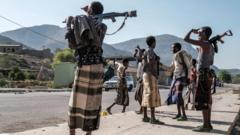The Tigray People's Liberation Front (TPLF), Ethiopia's leading opposition party, has voiced serious concerns regarding a recent ban on its political activities, describing it as a potential "serious threat" to the 2022 peace agreement that concluded two years of debilitating conflict in the Tigray region. The party has urged for intervention from the African Union as a reaction to the electoral body’s decision to revoke its legal status.
The National Election Board of Ethiopia announced the TPLF’s ban on the grounds that it had failed to conduct a mandatory general assembly. This decision comes against the backdrop of rising political tensions in Tigray and ahead of nationally scheduled elections by June of next year. The TPLF previously governed Ethiopia through a coalition regime that lasted from 1991 until Prime Minister Abiy Ahmed's rise to power in 2019, which led to significant political changes and exacerbated conflict.
The TPLF currently runs Tigray's interim administration, established in 2023 as part of a peace deal known as the Pretoria agreement. Internal elections have been stalled due to factional disputes within the party. In response to its deregistration, the TPLF has called on the African Union to pressure the federal government to halt the enforcement of the ban. The party claims that the ban undermines its rights as reinstated by the Pretoria Agreement and poses a direct threat to the fragile foundation of the peace process initiated after widespread violence.
TPLF deputy chairman Ammanuel Assefa expressed the gravity of the situation, stating that the electoral board's decision jeopardizes the Pretoria agreement and could stir further unrest. With the return of approximately one million displaced individuals still pending as part of the peace accord, there are mounting fears of renewed violence in the region. Observations from international actors, including the US, UK, and the European Union, underline the urgency of maintaining peace and preventing any resurgence of conflict in Ethiopia.
















